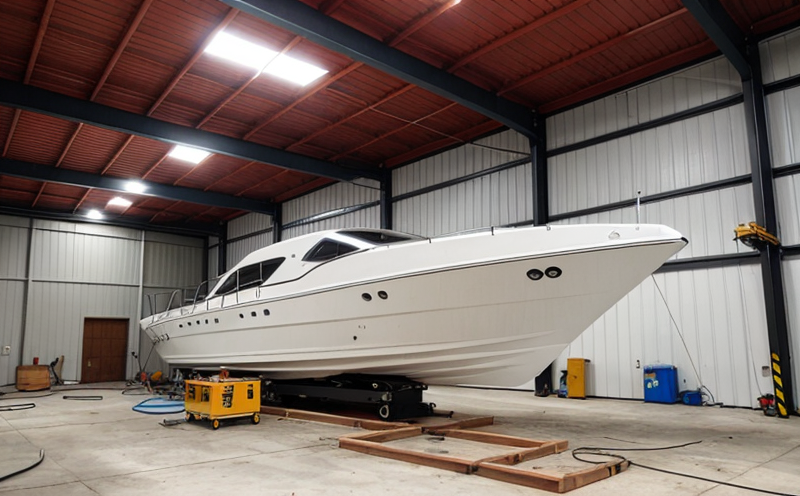ISO 5470 Abrasion Testing of Hull Protective Paints
The ISO 5470 abrasion testing procedure is a critical method in the marine and ship equipment sector, aimed at evaluating the durability and protective capabilities of hull protective paints. This test assesses how well these paints can withstand environmental stressors such as sand, gravel, and other abrasive materials that may cause erosion over time. The primary purpose of this service is to ensure that ships operate efficiently by minimizing wear and tear on the hull which could otherwise lead to leaks or structural failure.
During ISO 5470 testing, a rotating steel brush simulates real-world conditions where abrasion occurs naturally against the ship's hull surface. The test measures the resistance of the paint to this abrasive action using standardized protocols defined by international standards like ISO 8214-1. By conducting these tests prior to deployment, marine engineers can select paints that offer superior protection and longevity.
The abrasion testing process typically involves several steps. First, the ship's hull area to be tested is isolated and cleaned thoroughly. Specimens of paint samples are then prepared according to ISO 5470 guidelines which specify precise dimensions and thicknesses. Once ready, the specimens undergo rotation under controlled conditions until they reach a predefined level of wear or loss in weight.
The results from this testing provide valuable insights into the performance characteristics of different paints available on the market today. Engineers responsible for maintaining ships' integrity rely heavily upon these findings when selecting appropriate coatings for their vessels. Compliance officers also ensure that all materials used comply with relevant regulations set forth by governing bodies such as the International Maritime Organization (IMO).
Understanding what constitutes effective abrasion resistance is crucial because it directly impacts operational costs and safety factors associated with maritime operations. For instance, if a particular paint fails to meet expected standards after undergoing ISO 5470 testing, there may be increased risk of corrosion or damage due to environmental elements. On the other hand, successful passage through this rigorous evaluation process increases confidence in the chosen material’s ability to perform its intended function effectively.
It is worth noting that while many factors contribute to a ship's overall durability, maintaining the integrity of its hull remains one of the most important aspects. Properly applied and well-tested protective paints play an essential role in achieving this goal. Through continuous monitoring and updates based on new developments within both technology and regulatory environments, modern ships continue to become more resilient against harsh conditions encountered during voyages.
For those involved in quality management or compliance matters related to shipbuilding projects, understanding the nuances of ISO 5470 testing can prove invaluable. It allows stakeholders to make informed decisions about which products best suit their needs while ensuring they remain compliant with all applicable rules and guidelines.
- Customer Impact: Reduced maintenance costs due to prolonged paint life; enhanced safety through better protection against environmental stressors; improved reputation as a reliable supplier of quality maritime solutions.
Eurolab Advantages
At Eurolab, we pride ourselves on delivering world-class abrasion testing services tailored specifically for the marine and ship equipment sector. Our state-of-the-art facilities are equipped with advanced instrumentation capable of replicating realistic operational scenarios experienced by ships worldwide. This ensures accurate measurements that reflect true performance under actual conditions.
Our team consists of highly experienced technicians who have extensive knowledge in both theoretical aspects of paint science as well as practical application techniques. They work closely with clients to understand specific requirements and deliver customized solutions that meet individual project needs. Whether you require single-point testing or comprehensive programmatic assessments, our experts are committed to providing high-quality results every time.
In addition to technical expertise, Eurolab offers several additional benefits:
- Accurate and reliable data interpretation
- Fast turnaround times for timely delivery of reports
- Comprehensive documentation supporting all testing procedures
- Access to industry-leading analysts who stay current with latest trends in marine technology
Choose Eurolab for your ISO 5470 abrasion testing requirements and experience the difference that precision engineering can make. With us, you can rest assured knowing that your hull protective paints will undergo thorough evaluation to ensure they provide optimal protection against abrasive forces encountered during marine operations.
Quality and Reliability Assurance
At Eurolab, we understand the importance of maintaining stringent quality control measures throughout every stage of the testing process. From initial sample preparation through final analysis, our procedures adhere strictly to ISO 5470 standards ensuring consistent results across multiple trials. Our commitment to excellence extends beyond mere compliance; it includes proactive efforts aimed at improving overall paint performance.
To achieve this level of accuracy and reliability, Eurolab employs several key practices:
- Regular calibration of testing equipment to ensure precision
- Detailed documentation of all test parameters for transparency and traceability
- Use of standardized protocols developed by recognized authorities in the field
- Continuous training and education of staff members to stay updated with emerging technologies
The rigorous nature of our quality assurance practices guarantees that clients receive trustworthy data upon which they can base important decisions regarding their hull protective paints. By partnering with Eurolab, organizations benefit from peace of mind knowing that each test result reflects real-world conditions accurately.





